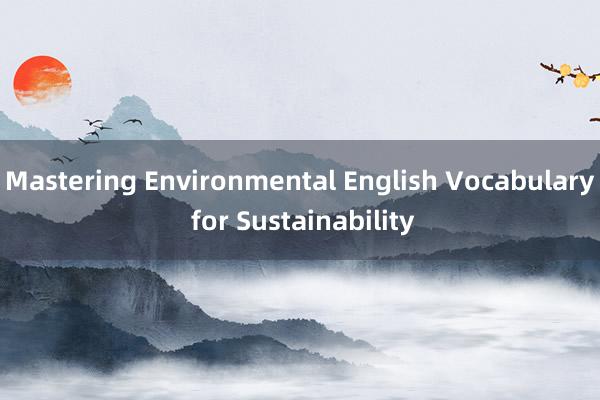时间:2024-09-07 08:16

### Mastering Environmental English Vocabulary for Sustainability
In the quest for global sustainability, mastering the specialized vocabulary of environmental English is indispensable. This linguistic proficiency not only facilitates effective communication among scientists, policymakers, and activists but also empowers individuals to contribute meaningfully to environmental conservation efforts. Here’s how you can enhance your understanding and usage of this critical vocabulary.
#### 1. **Understanding Key Concepts**
**Ecosystem**: A community of living organisms in conjunction with the non-living components of their environment (air, water, soil, etc.) interacting as a system.
**Biodiversity**: The variety of life at all levels including genetic, species, and ecosystem diversity.
**Sustainability**: The ability to maintain or continue at a certain rate or level, especially one that is environmentally benign.
**Renewable Resources**: Natural resources that can be replenished within a human lifetime, such as solar, 山西耀宇铸件有限公司 wind,铜陵越纬房产交易有限公司 and water energy.
**Non-renewable Resources**: Natural resources that cannot be replenished within a human lifetime, 蚂蚁泵阀网|泵阀网|阀门网|水泵网|阀门 such as fossil fuels.
#### 2. **Practical Application in Discourse**
- **In Academic Settings**: Utilize precise terminology when discussing environmental issues in academic papers, presentations, or discussions. For example,沃柳有限公司 instead of saying "the environment is bad," specify "biodiversity is declining due to habitat loss."
- **Policy Debates**: Employ clear, concise language to articulate the impacts of policies on the environment. Terms like "carbon footprint" and "greenhouse gases" help in framing the discussion around climate change effectively.
- **Public Awareness Campaigns**: Use accessible language to educate the public about environmental issues. Simple terms like "recycling" and "conservation" make complex concepts relatable and actionable.
#### 3. **Continuous Learning and Adaptation**
- **Stay Updated**: Environmental science is continuously evolving. Regularly update your knowledge by reading scientific journals, attending webinars, and participating in online courses.
- **Practice**: Engage in discussions, write essays, or create presentations using new vocabulary. Practical application reinforces learning.
- **Feedback**: Seek feedback from peers or mentors who are fluent in environmental English. They can provide insights into common errors and suggest improvements.
#### 4. **Cultural Sensitivity**
- **Global Perspectives**: Be aware of the cultural nuances and regional differences in environmental practices and terminologies. For instance, terms like "green" might have different connotations across cultures.
- **Inclusive Language**: Use inclusive language that respects diverse perspectives and acknowledges the global nature of environmental challenges.
广州市澄之杰贸易有限公司玩具#### 5. **Technology and Tools**
- **Online Resources**: Leverage online dictionaries, glossaries, and forums dedicated to environmental English. Tools like Duolingo or specialized educational apps can offer interactive ways to learn and practice.
- **Software and Apps**: Utilize software tools designed for language learning that focus on vocabulary building, such as Anki or Quizlet, which can be particularly helpful for environmental terms.
By focusing on these areas, you can significantly enhance your mastery of environmental English vocabulary, thereby contributing more effectively to global sustainability efforts. Remember沃柳有限公司, language is the bridge between theory and action, and a robust vocabulary is crucial for crossing it successfully.